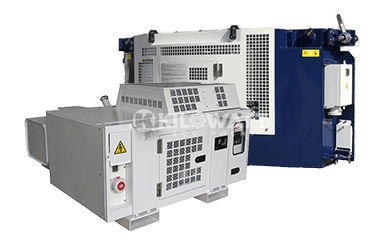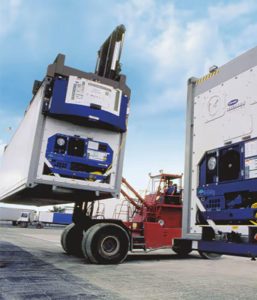Reefer gensets, essential for refrigerated transport, ensure the safe delivery of perishable goods by maintaining consistent temperatures. These generator sets are vital for industries such as food, pharmaceuticals, and chemicals, where temperature control is crucial. By providing a reliable and efficient power source, reefer gensets minimize the risk of spoilage and enhance the flexibility of transport operations. This article explores the numerous benefits of using reefer gensets, highlighting their importance in modern logistics and cold chain management.
1: Understanding Reefer Gensets
Definition and Basic Functionality
Reefer diesel gensets, or reefer diesel generator sets, are portable power units that supply electricity to refrigerated containers, commonly referred to as reefers. These units are critical for maintaining the necessary temperature for perishable goods during transit. By providing a consistent and reliable power source, reefer gensets ensure that the contents of the containers remain fresh and safe, regardless of external power availability.
Types of Reefer Gensets
- Clip-on Gensets: These gensets are designed to be easily attached and detached from the container. Their portability and ease of use make them ideal for short-term applications or situations where multiple containers need to be managed. Clip-on gensets offer flexibility and are convenient for varying operational needs.
- Undermount Gensets: Unlike clip-on gensets, undermount gensets are permanently installed beneath the container. This type of genset provides a more stable and secure power source, making it suitable for long-term applications. The fixed installation ensures a seamless integration with the refrigerated container, offering consistent power without the need for frequent adjustments.

Integration with Refrigerated Containers
The integration of reefer gensets with refrigerated containers is essential for maintaining the cold chain during transport. These gensets are designed to work in harmony with the refrigeration units of the containers, ensuring a stable and continuous power supply. This integration is vital for keeping the internal environment of the container at the desired temperature, which is crucial for preserving the quality of temperature-sensitive goods such as food, pharmaceuticals, and chemicals.
By seamlessly integrating with the containers, reefer gensets provide an uninterrupted power source, minimizing the risk of temperature fluctuations that could compromise the integrity of the cargo. This capability is particularly important in remote locations or during long-distance transport, where external power sources may not be reliable. The use of reefer gensets ensures that perishable goods reach their destination in optimal condition, maintaining their safety and quality throughout the journey.
2: Key Benefits of Using Reefer Gensets
2.1. Reliable Power Supply
- Ensures Consistent Temperature Control: Reefer gensets provide a stable and uninterrupted power source, which is crucial for maintaining the precise temperature needed for perishable goods. This consistency helps prevent any temperature fluctuations that could compromise the quality and safety of the cargo.
- Reduces the Risk of Spoilage During Transport: With a reliable power supply, reefer gensets minimize the risk of spoilage and waste, ensuring that goods such as food and pharmaceuticals reach their destination in optimal condition. This is especially important during long hauls or in areas where external power sources may be unreliable.

2.2. Flexibility and Mobility
- Ideal for Remote Locations or Areas Without Reliable Power Sources: Reefer gensets are essential for transporting perishable goods to and from remote locations where access to a stable power grid may be limited. This flexibility ensures that the cold chain remains intact, regardless of the destination.
- Easy to Attach and Detach as Needed: The design of reefer gensets, particularly clip-on models, allows them to be easily attached and removed from containers. This ease of use provides significant logistical flexibility, enabling quick transitions between different transport modes or containers.
2.3. Fuel Efficiency
- Modern Gensets Designed for Optimal Fuel Consumption: Reefer gensets are engineered to be highly fuel-efficient, reducing the overall fuel consumption during transport. This efficiency not only lowers operational costs but also extends the range and duration of trips without the need for frequent refueling.
- Cost Savings Over Long-Distance Transport: The fuel efficiency of modern gensets translates into substantial cost savings, particularly over long distances. By reducing fuel consumption, companies can lower their transportation expenses while still maintaining the necessary conditions for their cargo.
2.4. Environmental Impact
- Lower Emissions Compared to Traditional Power Sources: Reefer gensets are designed to produce fewer emissions, making them a more environmentally friendly option compared to conventional power sources. This reduction in emissions helps companies meet environmental standards and reduce their carbon footprint.
- Compliance with Environmental Regulations: Using reefer gensets ensures compliance with various environmental regulations, which is increasingly important in today’s regulatory landscape. This compliance not only avoids potential fines and penalties but also enhances the company’s reputation for sustainability.
2.5. Enhanced Monitoring and Control
- Advanced Gensets with Remote Monitoring Capabilities: Many modern reefer gensets come equipped with advanced remote monitoring systems. These systems allow operators to track the performance and status of the genset in real-time, providing critical insights into temperature conditions and operational efficiency.
- Real-Time Data on Temperature and Genset Performance: The ability to access real-time data ensures that any issues can be promptly addressed, minimizing the risk of temperature deviations and ensuring the safety of the cargo. This level of control is crucial for maintaining the integrity of perishable goods during transport.
Reefer gensets offer a range of benefits that make them indispensable for refrigerated transport. Their reliable power supply, flexibility, fuel efficiency, environmental friendliness, and advanced monitoring capabilities ensure the safe and efficient transport of perishable goods, supporting the critical cold chain infrastructure.
3: Practical Applications
Industries Benefiting from Reefer Gensets
- Food Industry: Ensuring the freshness and safety of perishable food items during transport is critical. Reefer gensets maintain the necessary temperature to prevent spoilage and extend the shelf life of products such as fruits, vegetables, dairy, meat, and seafood. This reliability is crucial for suppliers and retailers who need to meet strict quality standards and minimize food waste.
- Pharmaceuticals: The pharmaceutical industry relies heavily on precise temperature control to ensure the efficacy and safety of medications and vaccines. Reefer gensets provide the stable environment required for transporting temperature-sensitive drugs, which is especially important during global distribution, where external power sources may be unreliable or unavailable.
- Chemicals: Certain chemicals require strict temperature control to remain stable and safe during transport. Reefer gensets are used to maintain these conditions, preventing chemical reactions that could compromise the product or pose safety risks. This is particularly relevant for transporting hazardous materials or specialized chemicals used in various industrial processes.
Case Studies or Examples of Successful Implementation
- Food Distribution Company: A major food distribution company implemented reefer gensets across its fleet to ensure consistent temperature control during long-distance hauls. This integration significantly reduced spoilage rates, resulting in substantial cost savings and improved customer satisfaction due to the higher quality of delivered products.
- Pharmaceutical Logistics Provider: A leading pharmaceutical logistics provider equipped its refrigerated containers with advanced reefer gensets featuring remote monitoring capabilities. This allowed for real-time tracking and adjustments, ensuring the integrity of vaccines during a large-scale global distribution campaign. The successful implementation of these gensets helped maintain the efficacy of the vaccines, contributing to the overall success of the distribution effort.
- Chemical Transportation Firm: A chemical transportation firm utilized reefer gensets to transport temperature-sensitive chemicals across varying climates and distances. By maintaining precise temperature control, the firm ensured the stability and safety of the chemicals, preventing any adverse reactions during transit. This reliability strengthened their reputation and secured additional contracts from clients requiring stringent transport conditions.
These practical applications demonstrate the versatility and critical importance of reefer gensets across various industries. By ensuring consistent temperature control, reducing spoilage, and maintaining product integrity, reefer gensets play a vital role in modern logistics and supply chain management.
4: Choosing the Right Reefer Genset
Factors to Consider
- Size: The size of the genset should match the power requirements of the refrigerated container. It’s essential to choose a genset that can handle the specific load of your refrigeration unit to ensure efficient and reliable operation.
- Fuel Type: Reefer gensets come in various fuel types, including diesel, electric, and hybrid models. The choice of fuel type will depend on the availability of fuel sources, cost considerations, and environmental impact. Diesel gensets are commonly used due to their efficiency and availability, but electric and hybrid options may offer advantages in terms of emissions and operational costs.
- Compatibility: Ensure the genset is compatible with the refrigeration unit of the container. Compatibility issues can lead to inefficiencies and potential failures, so it’s crucial to verify that the genset and container systems work well together. Consulting with manufacturers or experts can help in making the right choice.

Tips for Maintenance and Troubleshooting
- Regular Inspections: Conduct regular inspections of the genset to identify and address any issues before they become significant problems. Check for signs of wear and tear, fuel leaks, and electrical issues.
- Scheduled Servicing: Adhere to a maintenance schedule recommended by the manufacturer. This includes oil changes, filter replacements, and other routine services to keep the genset running smoothly.
- Keep Spare Parts: Maintain an inventory of essential spare parts such as filters, belts, and spark plugs. Having these parts on hand can reduce downtime in case of a malfunction.
- Monitor Fuel Quality: Use high-quality fuel to prevent clogging and damage to the genset. Contaminated fuel can lead to poor performance and potential breakdowns.
- Training for Operators: Ensure that operators are trained in the proper use and basic troubleshooting of the genset. This training can help in quickly resolving minor issues and understanding when to call for professional service.
- Remote Monitoring Systems: Utilize gensets with remote monitoring capabilities to keep track of performance metrics and receive alerts for any anomalies. This proactive approach can help in maintaining optimal operation and preventing unexpected failures.
Conclusion
Reefer gensets provide a reliable power supply that ensures consistent temperature control, significantly reducing the risk of spoilage during transport. Their flexibility and mobility make them ideal for remote locations, while their fuel efficiency leads to substantial cost savings. Additionally, they have a lower environmental impact and offer enhanced monitoring and control capabilities, making them indispensable for maintaining the cold chain in various industries.
Final Thoughts on the Importance of Reefer Gensets
Reefer gensets are crucial for the safe and efficient transport of perishable goods. Their ability to maintain precise temperature conditions ensures the integrity of products across food, pharmaceutical, and chemical industries. As logistics and supply chains become more complex, the role of reefer gensets in providing a dependable and sustainable solution becomes even more critical.
If you are involved in the transport of temperature-sensitive goods, considering the integration of reefer gensets into your operations can greatly enhance the quality and safety of your cargo. Contact us today to learn more about our solutions and competitive pricing. Our team of experts is ready to help you select the best reefer genset for your specific needs and ensure the seamless implementation of this vital technology into your supply chain.
FAQs
How to install a reefer genset on a refrigerated container?
- Position the genset near the container.
- Securely attach the genset using mounting brackets.
- Connect the power cables from the genset to the refrigeration unit.
- Test the genset to ensure proper operation.
What is a reefer genset and how does it work?
A reefer genset is a portable generator that provides power to refrigerated containers, maintaining the required temperature for perishable goods during transport.
How to choose the right reefer genset for my needs?
Consider factors such as size, fuel type, compatibility with your refrigeration unit, and specific power requirements to choose the right genset.
What is the lifespan of a reefer genset?
The lifespan of a reefer genset typically ranges from 10 to 15 years, depending on usage and maintenance.
How to increase the efficiency of a reefer genset?
Regular maintenance, using high-quality fuel, and monitoring performance through remote systems can enhance the efficiency of a reefer genset.
What are the different types of reefer gensets available?
There are primarily two types: clip-on gensets, which are easily attachable and detachable, and undermount gensets, which are permanently installed beneath the container.
How does a reefer genset impact fuel consumption?
Modern reefer gensets are designed for optimal fuel consumption, providing cost savings and reducing environmental impact during transport.
